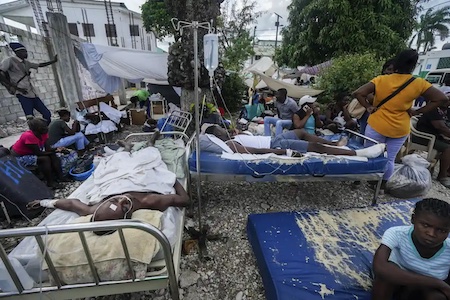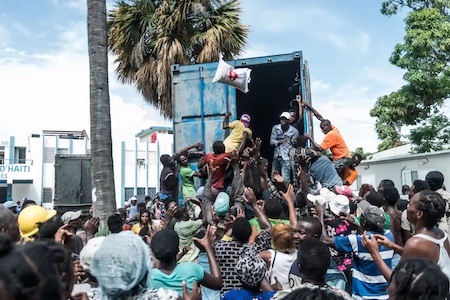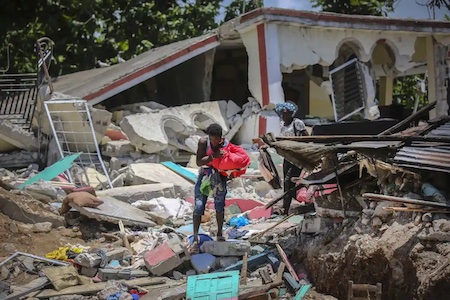Haiti needs help, but ‘not from aid workers who never leave their SUVs’
 Print This Print This
By Joe Parkin Daniels | The Guardian
from The Guardian
Monday, Aug 30, 2021
Beset by earthquakes, poverty and gang violence, the country is desperate for aid. However it must be the right kind, say locals
The death toll is still rising 10 days after a catastrophic earthquake struck southern Haiti on the morning of 14 August, levelling much of Les Cayes and the surrounding region.
More than 2,200 deaths have been recorded so far, while at least 30,000 families have had to abandon their homes. Many were sleeping on the streets when Tropical Storm Grace struck two days later, bringing high winds and pelting rain.
But despite the hardship, many Haitians are wary of the massive international aid response which is still under way. “We don’t like international aid but it’s not like we have a choice,” says Marjorie Modesty, a community leader in Les Cayes, whose home was flooded and damaged in the dual disasters.
“International organisations spend money on the wrong things, like expensive hotels and cars. Our relationship with them is, at best, so-so.”
 |
| The injured lie in beds outside the Immaculée Conception hospital in Les Cayes, Haiti, two days after a 7.2-magnitude earthquake struck the south-western part of the country. Photograph: Fernando Llano/AP |
Haiti’s relationship with aid is long and often toxic. The Caribbean country, which shares the island of Hispaniola with its wealthier neighbour, the Dominican Republic, is the western hemisphere’s poorest. Nearly half of its population of 11.4 million is food insecure. Sitting on top of a fault line, Haiti is often battered by earthquakes and extreme weather events.
Political violence and urban gang warfare have racked Haiti for more than two years, with roadblocks, fuel shortages and power cuts a daily reality. The brazen assassination of President Jovenel Moïse on 7 July, allegedly carried out by Colombian mercenaries, only added to the turmoil. Gangs have also complicated the aid response, sporadically blocking key roads and holding up deliveries of food and supplies.
“The population is traumatised by repeated disasters,” says Jean Raymond Delinois, who works for Acape, an education non-profit in Jeremie, which suffered heavy damage. Delinois’s home still stands but needs repairs. He has not yet seen any major rollout of international aid in his province. “Without coordination and participation of local actors, it won’t change much,” he says.
In 2010, much of Port-au-Prince was flattened by a magnitude 7 earthquake, taking 220,000 lives with it. The latest quake was two decimal points bigger in magnitude but struck a less densely populated region.
The relief effort 11 years ago was riddled with controversy. Aid workers at Oxfam were found to be trading food and supplies for sex, while a cholera outbreak that took more than 9,000 lives is likely to have begun with the arrival of the United Nation’s peacekeeping mission in October 2010.
Since then, international charities and humanitarian organisations have been viewed with suspicion. White pickup trucks, emblazoned with NGO logos, move foreign employees around the cities, using Haitians as drivers and private security. With more than 3,000 NGOs operating within its borders, Haiti is often described as an “aid state”.
 |
| A man throws a bag of rice into a crowd of earthquake victims in Les Cayes, Haiti on August 20, 2021
Distributing food and water at the ‘4 Chemins’ crossroads in Les Cayes, Haiti, last week. Photograph: Reginald Louissaint Jr/AFP/Getty Images |
“The [international NGOs] do what they want, not what we need,” says Modesty, from her damaged home. “They ignore the communities, the leaders, and the needs of the communities.”
Haiti’s prime minister, Ariel Henry, who has been leading the country since Moïse’s murder, acknowledged Haiti’s rocky relationship with aid after the 2010 earthquake. “My government does not intend to repeat history on the mismanagement and coordination of aid,” he tweeted last week in French, a language spoken by few outside the ruling classes. “I will personally ensure that this help reaches the real victims.”
In the southern, quake-hit provinces of Grand Anse, Sud and Nippes, local rescuers and villagers were initially working on the recovery alone, having been cut off from the rest of the country by the storm. They are now bolstered by international brigades as they search through rubble for survivors and corpses. Analysts see little reason to think that previous mistakes won’t be repeated.
 |
| People recover their belongings from homes destroyed in the earthquake in Camp-Perrin, Les Cayes. Photograph: Joseph Odelyn/AP |
“Part of the problem is that international folks don’t talk to people on the ground, and that is going to be worse this time because everyone is afraid of the security situation,” says Emily Troutman, a freelance writer who has been covering Haiti’s relationship with aid for more than a decade.
“So you get a lot of white people driving around in their white SUVs, not getting out of their cars, and they’re the ones making the decisions about what Haitians need and where they need it.”
Troutman says that organisations that have been operating in Haiti for years, building relationships with communities, are best positioned to contribute positively to the relief effort – “organisations that already have the human capital, the physical capital, the knowhow, and the social capital to do something”.
“What Haiti doesn’t need is a bunch of fly-by-night people who are gonna pop in for the disaster and pop out.”
Source URL
|
 Print This Print This

|

